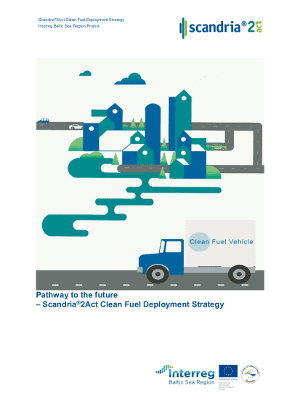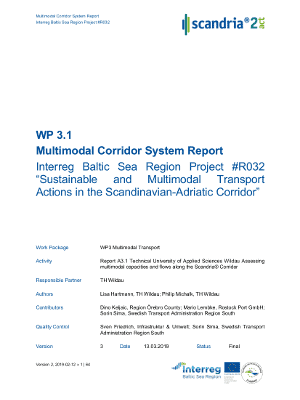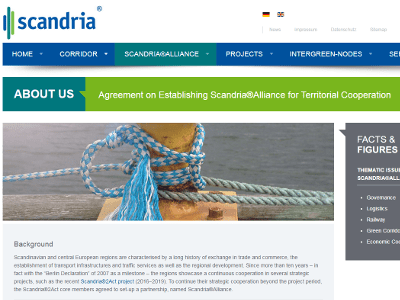Scandria®2Act
The background
The Scandinavian-Mediterranean Core Network Corridor connects Helsinki (Finland) and Oslo (Norway) with Palermo (Italy) via Sweden, Germany, and Austria. It is one of nine corridors in Europe that make up a Europe-wide transport network of railway lines, roads, inland waterways, maritime shipping routes, ports, airports and railroad terminals, also called Trans-European Transport Network (TEN-T). TEN-T was launched by the EU institutions as one major policy of the EU in the mid 1990s. The idea of Transnational European Networks goes back to the Treaty of Rome (1957). Europe-wide networks of transport, of energy (TEN-E) and of telecommunications (eTEN) are considered as a fundament for the internal European market and for economic and social cohesion of the European Union. The “core transport network” includes the most important connections, linking the most important cities, and is to be completed by 2030. The “comprehensive network” covers all European regions and is to be completed by 2050. To complete these networks is a matter of smaller and large infrastructure constructions such as the Øresundbridge between Denmark and Sweden (completed) or the Fehmarn Belt Railway axis between Germany and Denmark (ongoing).
The challenge
TEN-T policy affects the regions along the corridors to a large extend, and can be expected to have many positive but also negative effects. As transport policy is typically a matter of national responsibility, the regions’ needs, concerns and proposals are not automatically considered in TEN-T implementation.
The project Scandria®2Act was an intiative of several regional and local councils and public authorities along the Scandinavian-Mediterranean Core Network corridor. With support of a number of established research institutes, Scandria®2Act wanted to foster clean, multimodal transport through those corridor regions. It aimed at increasing connectivity and competitiveness, while at the same time minimising the negative environmental impact induced by transport activities.
Budgets
in numbers
-
3.62MillionTotal
-
2.40MillionErdf
-
0.00MillionEni + Russia
-
0.21MillionNorway
Achievements
In pilot actions, the partners developed or improved multimodal services – both for passenger transport and freight transport in collaboration with the European integrating system “EU-Spirit”. Now, customers of public transport in Berlin-Brandenburg, Skåne and Greater Copenhagen are able to get better and real time information. The ports of Rostock and Oslo as well as Region Örebro and Hamburg developed new multimodal concepts, e.g. for freight trains. The partnership developed a strategy to deploy clean fuels along the Scandria®Corridor, making use of the experiences made in the corridor regions.
The Scandria®2Act partnership established a new governance mechanism by formally establishing the Scandria®Alliance, a cooperation platform of regions located along the Scandria®Corridor to create mutual benefit from the development of the European transport corridors. The Scandria®Alliance General Assembly constituted formally on 5 March 2019.
The Interreg project Scandria®2Act eastablished the Scandria®Alliance as a think tank for experts aiming to foster a change in mobility towards a more integrated and sustainable system. The founding member were the regions Helsinki-Ussimaa, Skane, Örebro, Akershus/Eastern Norway County Network, Berlin-Brandenburg as well as the City of Turku. They concluded a cooperation agreement on issues related to the Scandria®Corridor that are relevant for the regions development; i.e. the deployment of clean fuels, the fostering of multimodal transport, the improvement of cross-border rail links as well as initiatives to digitalise transport services.
Outputs
Pathway to the future – Scandria®2Act clean fuel deployment strategy

Multimodal corridor system report

Scandria®Alliance

Project Stories
-
24.10.2019
What municipalities and cities get out of Interreg projects
Interreg is all about the regional development of municipalities and cities. Every tenth project partner in projects funded by Interreg Baltic Sea Region is a local public authority, i.e. an institution involved in governing a municipality or city. But why exactly do they participate in cooperation projects?Read full story
Partners
Joint Spatial Planning Department Berlin-Brandenburg
- TownPotsdam
- RegionPotsdam, Kreisfreie Stadt
- CountryGermany
- RepresentativeUlrike Assig
- Phone
- E-Mail
- Web
Eastern Norway County Network
- TownOslo
- RegionOslo
- CountryNorway
- RepresentativeJon Petter Arntzen
- Phone
- E-Mail
- Web
Akershus County Council
- TownOslo
- RegionOslo
- CountryNorway
- RepresentativeStig Hvoslef
- Phone
- E-Mail
- Web
Helsinki-Uusimaa Regional Council
- TownHelsinki
- RegionHelsinki-Uusimaa
- CountryFinland
- RepresentativeMalla Paajanen
- Phone
- E-Mail
- Web
Turku Science Park Ltd.
- TownTurku
- RegionVarsinais-Suomi
- CountryFinland
- RepresentativePipa Turvanen
- Phone
- E-Mail
- Web
University of Turku
- TownTurku
- RegionVarsinais-Suomi
- CountryFinland
- RepresentativeTomi Solakivi
- Phone
- E-Mail
- Web
Swedish Transport Administration
- TownKristianstad
- RegionSkåne län
- CountrySweden
- RepresentativeSorin Sima
- Phone
- E-Mail
- Web
Region Skåne
- TownKristianstad
- RegionSkåne län
- CountrySweden
- RepresentativeEmmy Harlid Westholm
- Phone
- E-Mail
- Web
Skåne Association of Local Authorities
- TownLund
- RegionSkåne län
- CountrySweden
- RepresentativeDesirée Grahn
- Phone
- E-Mail
- Web
RISE Research Institutes of Sweden AB
- TownBorås
- RegionVästra Götalands län
- CountrySweden
- RepresentativeAnna Alexandersson
- Phone
- E-Mail
- Web
Region Örebro County
- TownÖrebro
- RegionÖrebro län
- CountrySweden
- RepresentativeLovisa Uhlin
- Phone
- E-Mail
- Web
Rostock Port
- TownRostock
- RegionRostock, Kreisfreie Stadt
- CountryGermany
- RepresentativeMario Lembke
- Phone
- E-Mail
- Web
Public transport authority Berlin-Brandenburg
- TownBerlin
- RegionBerlin
- CountryGermany
- RepresentativeJuergen Ross
- Phone
- E-Mail
- Web
Technical University of Applied Sciences Wildau
- TownWildau
- RegionDahme-Spreewald
- CountryGermany
- RepresentativePhilip Michalk
- Phone
- E-Mail
- Web
SUCCEEDED by PP20 (01.07.2018): Logistics Initiative Hamburg
- TownHamburg
- RegionHamburg
- CountryGermany
- RepresentativeThomas Brauner
- Phone
- E-Mail
- Web
German Energy Agency
- TownBerlin
- RegionBerlin
- CountryGermany
- RepresentativeStefan Siegemund
- Phone
- E-Mail
- Web
Rejseplanen
- TownValby
- RegionKøbenhavns omegn
- CountryDenmark
- RepresentativeJørgen Sinding
- Phone
- E-Mail
- Web
Technical University of Denmark
- TownKgs. Lyngby
- RegionKøbenhavns omegn
- CountryDenmark
- RepresentativeHarilaos Psaraftis
- Phone
- E-Mail
- Web
Copenhagen Business School
- TownFrederiksberg
- RegionByen København
- CountryDenmark
- RepresentativeLuise Noring
- Phone
- E-Mail
- Web
Logistics Initiative Hamburg Management GmbH
- TownHamburg
- RegionHamburg
- CountryGermany
- RepresentativeThomas Brauner
- Phone
- E-Mail
- Web
-
Project managerSven FriedrichINFRASTRUKTUR & UMWELT
-
Legal representativeJan DrewsJoint Spatial Planning Department Berlin-Brandenburg
-
Financial managerChristian GeringINFRASTRUKTUR & UMWELT Professor Böhm und Partner
-
Communication managerSven FriedrichINFRASTRUKTUR & UMWELT



